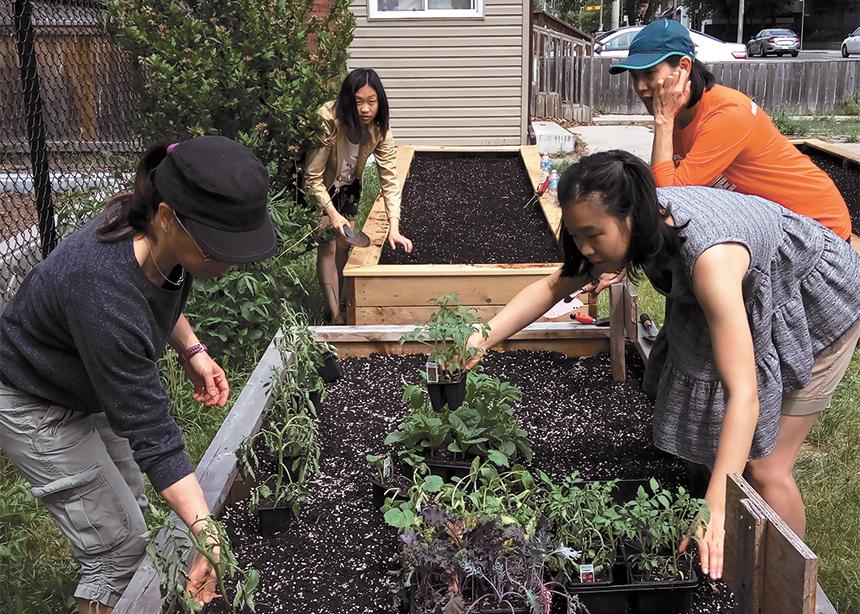Christen Kong, 27, was part of the community outreach team at Toronto Chinese Mennonite Church when the group started a local butterfly garden to encourage pollinators. Kong marvels at how that small garden project became a “community connector” and a place of healing and wholeness.
In a neighbourhood with food insecurity and high unemployment, the garden provided people with a little bit of fresh produce. But gardening also “gave them something to do” and gave them some purpose and meaning, Kong says. The garden “provided more healing than we thought as a church.”
Kong, who has served with Mennonite Central Committee (MCC) and Mennonite Disaster Service, values what she calls “holistic” expressions of faith. Projects like community gardens, soup kitchens, food banks and clothing banks can end up being a way to draw people into the church.
She encourages every congregation to figure out what it means to be the church in its local context. It’s how her church began 40 years ago, when a pastor reached out to offer English-language tutoring to Chinese immigrants and invited them to church. And it is a vision of the church that inspires this young adult today.
But her vision doesn’t stop at the local community. Kong is Mennonite Church Canada’s delegate to the Global Youth Summit, a gathering of young Anabaptists from around the world that will precede the next Mennonite World Conference assembly in July 2022 in Salatiga, Indonesia. She is eager to learn from the Mennonite family, “sharing what it means to live out their faith in each local context.”
As someone who uses technology in her communications job, she says, “Technology is revealing itself as a powerful tool because of COVID.” It can be a tool to advocate, mobilize and connect “beyond borders.”
Kong says she is learning “how to harness digital media platforms.” She acknowledges that there are barriers, but she is confident “there is always a way” to innovate and move beyond them.
Currently she is using the online Zoom platform to lead a Bible study in South Africa with friends she made during a one-year Serving and Learning Together (SALT) experience she had through MCC.
Technology can also be used to “break isolation,” she says. Since her church has been using online tools for worship and connection, she has noticed that people seem to “engage more fully” with the pastor after a sermon and ask deeper questions. She says, “I am falling in love with these small discussion groups on Sundays,” and learning more about the people at her church than ever before.
She notices that isolation is pushing people to find other forms of communication and gathering. She sees online church as a less intimidating place to “break down some barriers by bringing friends.” The pandemic has “brought more important discussions to the forefront,” she says, adding that non-Christian friends are asking a lot of faith questions.
She sees the potential in technology for “harnessing a lot of creativity and art in faith-based communities.” She would like to see people produce content about faith—what speaks to their heart—through visual arts, writing, poetry, music and dance. She sees art as a medium for community building and for sharing across the globe.
She says that churches and art galleries are the first places to go in a new place, to understand culture. She is curious to explore how culture impacts what it means to be Anabaptist in various countries around the world. She asks, “What speaks to you personally in your local context, but what does that look like when we bring it all together, and what are the patterns or differences or similarities that come out of that?”
She is disappointed that MWC shifted its next assembly to 2022, because she was so excited to meet other Anabaptists from around the world next year. But the extra time will give her and the other Canadian delegates to the youth summit time to prepare. They will be asked to work on a project together in the meantime. While they don’t have specific information about the project’s focus yet, they have met over Zoom and are eager to get started.
Kong is grateful for the opportunity to connect across continents, to share new experiences and to share in each other’s struggles. This interchange of faith and culture, Kong believes, will enrich the faith of all.
Do you have a story idea about Mennonites in Eastern Canada? Send it to Janet Bauman at ec@canadianmennonite.org.




Add new comment
Canadian Mennonite invites comments and encourages constructive discussion about our content. Actual full names (first and last) are required. Comments are moderated and may be edited. They will not appear online until approved and will be posted during business hours. Some comments may be reproduced in print.